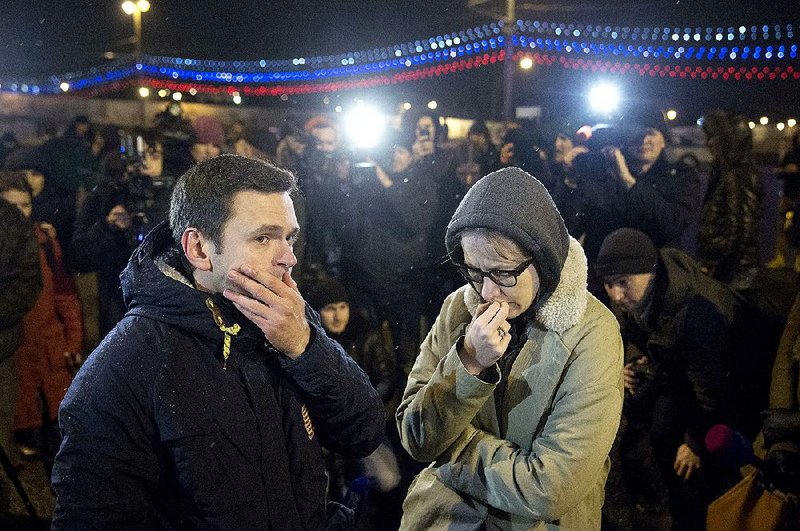MOSCOW -- A prominent Russian opposition leader, Boris Nemtsov, was shot dead in central Moscow late Friday within sight of the Kremlin walls.
Nemtsov, 55, had been a central figure in Russian political life since the breakup of the Soviet Union. He was a first deputy prime minister under Boris Yeltsin and later helped organize opposition demonstrations against President Vladimir Putin. His slaying was confirmed by Russia's Interior Ministry early today.
He rose to prominence as the governor of Nizhny Novgorod Oblast and became a vice premier in the late 1990s during the last years of Yeltsin's presidency.
Since leaving the Duma, the lower house of Russia's parliament, in 2003, he has founded and led a number of opposition parties and organizations, the latest being the Republican Party of Russia--People's Freedom Party, a registered political party.
The attack happened less than two days before Nemtsov was to lead another mass rally against Putin. The rally's organizers put out a statement of purpose earlier Friday denouncing Putin for the country's growing economic crisis and its part in the war in Ukraine.
Nemtsov was walking on the Bolshoi Kammeny Most, a bridge south of the Kremlin, when he was fired upon at least seven times from a passing car, Vladimir Markin, the spokesman for Russia's Investigative Committee, told state news media. Markin said witnesses were being questioned. No suspects were reported to be in custody.
The Interfax news service, citing a police source, said the shooting appeared to have been a contract killing.
Nemtsov, an economic reformer under Yeltsin, had toiled for more than a decade in the opposition to Putin.
He angered the government two years ago when he said billions of dollars had been stolen from funds designated for the 2014 Winter Olympics in Sochi, his home town. He blamed "Putin's friends" for the purported embezzlement, which he described as "a real threat to Russia's national security."
In 2012, Putin warned publicly that his opponents were prepared to murder one of their own so they could blame him for the death.
"They are looking for a so-called sacrificial victim among some prominent figures," Putin, a former KGB agent, said ahead of Russia's 2012 presidential election. "They will knock him off, I beg your pardon, and then blame the authorities for that."
Nemtsov said at the time that it was up to the authorities to prevent such a crime.
"If the head of the federal government, who controls all intelligence agencies, makes a public statement that he has information about such a provocation and such a crime, he must do everything to prevent it and not just publicly scare Russians," he told the Interfax news agency.
In the decade after Putin's rise to the presidency, several prominent journalists and rights workers were shot to death in attacks seen as retribution for their work.
Paul Khlebnikov of Forbes was shot in 2004; Anna Politkovskaya, well known for her fiery polemics against the war in Chechnya, was shot in 2006. Natalya Estemirova, a human-rights worker, was kidnapped and shot to death in the North Caucasus in 2009.
Information for this article was contributed by Andrew Roth of The New York Times and by Michael Birnbaum and William Branigin of The Washington Post.
A Section on 02/28/2015
